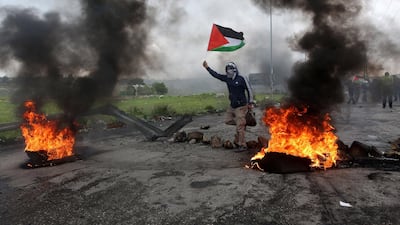Palestinian officials have sent top mediators, including the UN, a response to the US peace plan that was released this year and allows Israel to annex parts of the occupied West Bank.
The proposal demands the creation of a sovereign Palestinian state, independent and demilitarised, and some minor border changes.
Palestinian Prime Minister Mohammed Shtayyeh said it was sent "a few days ago" to the UN, US, EU and Russia, which were mediating in the Palestinian-Israeli conflict.
The Palestinian text included possible land swaps that were to be agreed to by the two future states.
US President Donald Trump's peace plan, which was announced in Washington at the end of January, includes the annexation by Israel of its settlements and of the Jordan Valley in the West Bank.
More than 450,000 Israelis live in West Bank settlements that are deemed illegal under international law, alongside 2.7 million Palestinians.
Washington's proposals provided for the creation of a Palestinian state, but on reduced territory and without Palestinians's core demand of a capital in east Jerusalem.
The plan was rejected in its entirety by the Palestinians and top officials have refused to engage with the Trump administration.
Mr Shtayyeh said the US plan was an “existential threat” to diplomatic efforts for an agreement where Israel and Palestine could establish two states side by side.
Palestinian leaders have declared statehood in the past, but the territories remain occupied by Israel due to a lack of full international recognition.
The EU was highly critical of Mr Trump’s peace plan and is demanding that Israel abandon its annexation ambitions, to be revealed after July 1.
Analysts say Israeli Prime Minister Benjamin Netanyahu has a narrow window of opportunity to implement Mr Trump's deal before the US presidential election in November.
Mr Trump’s Democratic rival, Joe Biden, has opposed the plan and could stop it if he wins the election.
EU member states are considering options such as economic sanctions or recognition of Palestinian statehood to dissuade Israel from going ahead with the plan.
They are also looking at what measures to take if Israel were not deterred, diplomats say.
"We want Israel to feel international pressure," Mr Shtayyeh said in Ramallah, where the Palestinian Authority is based.
"For the first time the European political allies are discussing sanctions against Israel because we asked for them."
On Wednesday, German Foreign Minister Heiko Maas will travel to Jerusalem, where he will meet Mr Netanyahu and the country's foreign and defence ministers.
Annexation is expected to be high on the agenda, with Israel intent on toning down Europe's response to the move.
Mr Maas will not travel to Ramallah but is due to hold a video conference with Mr Shtayyeh from Amman, where he will meet the Jordanian Foreign Minister, Ayman Safadi.
In recent days, demonstrations against the annexation have increased in the West Bank and in Israel.
But they did not draw large crowds on the Palestinian side.
"The anger is there, the dissatisfaction is there, the frustration is there and all that is a recipe for more problems," Mr Shtayyeh said.
He said the Palestinian Authority, led by president Mahmoud Abbas, wanted to avoid widespread disruption.
An Israeli poll last week showed most Israelis feared annexation would spark a Palestinian uprising.
Meanwhile, the Palestinian government announced on Tuesday that it was ending its two-month coronavirus lockdown in the West Bank, after a steady decline in new cases.


















